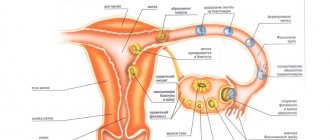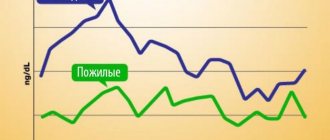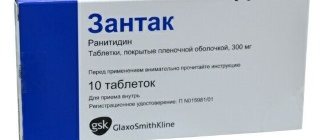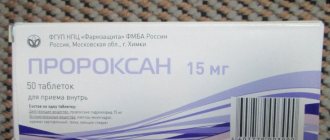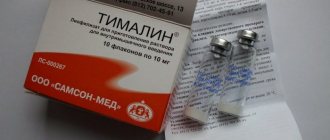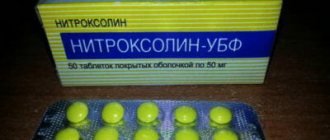Zincteral tablets are a pharmacological drug in the form of tablets, which are prescribed for acute deficiency of zinc in the body. This drug is a mineral food supplement that replenishes zinc deficiency and stimulates metabolic processes in the human body. Zincteral is the most effective for acne. However, the medicine is taken only as prescribed by a doctor and strictly following the instructions.
Instructions for use of Zincteral
Zincteral vitamins based on zinc belong to the group of mineral supplements that prevent the development of problems associated with a lack of this element in the body. They are prescribed by a doctor for poor diet, stress, and some genetic diseases. The tablets are taken by adults and children over four years of age and contain zinc sulfate as an active ingredient.
Composition and release form
The drug is available in the form of round tablets, the color is purple-pink. The surface of the tablet is homogeneous, coated, without inclusions or deformations. The active ingredient is zinc sulfate. The detailed composition is presented in the table.
| Compound | Weight |
| Zinc sulfate | 124 mg |
| Auxiliary components | |
| Lactose monohydrate | |
| Potato starch | |
| Povidone | |
| Talc | |
| Magnesium stearate | |
| Shell | |
| Hypromellose | |
| Titanium dioxide | |
| Polyethylene glycol | |
| Azorubine dye | |
Pharmacodynamics and pharmacokinetics
Zincteral refers to drugs that are taken to compensate for the lack of a microelement in the body. Zinc takes part in a number of enzyme systems that have a direct effect on metabolic processes. The effectiveness of more than 200 enzymes (alcohol dehydrogenase, carboxypeptidase A, alkaline phosphatase, RNA polymerase) depends on zinc, which, in addition, performs an important function in preserving the structure of cell membranes, nucleic acids and the very structure of proteins. Zinc is involved in protein synthesis and carbohydrate metabolism.
The drug plays an important role in the process of cell growth and development, supports the functioning of the visual and immune systems, sense of smell and taste. Course use of the drug leads to an extension of the period of action of insulin, its accumulation in tissues, and stabilization of the level of vitamin A in the blood. The role of micromineral in maintaining the normal condition of the skin and its derivatives (elimination of inflammation, normalization of keratinization processes) is well known. The element is an effective antioxidant. Its regular use strengthens nonspecific immunity.
After consuming the drug, about 20-30% of the active substance is absorbed in the small and duodenal intestines. The maximum concentration level is achieved within two hours after oral administration. Once inside, the dose of the drug is distributed in bone tissue, skin, leukocytes and red blood cells, kidneys, liver, prostate and pancreas, and retina. Binding occurs to plasma proteins (albumin, amino acids and macroglobulin). Excretion from the body occurs through the intestines (about 90% of the total dose), as well as through urine and sweat.
Indications for use
The main purpose of using Zincteral is to eliminate zinc deficiency, deficiency of which often occurs in connection with parasitic intestinal infections, hemodialysis, gastrectomy, short bowel syndrome, pancreatic insufficiency, cystic fibrosis, kidney and intestinal diseases, and malnutrition. Skin diseases, chronic stress, injuries, infections due to the reduced reactive potential of the immune system contribute to the development of zinc deficiency. Indications for use:
- long-term use of corticosteroids;
- enteropathic acrodermatitis;
- pustular/purulent acne;
- malignant/pattern baldness (alopecia);
- difficult-to-heal injuries and wounds.
Use of the drug Zincteral
Orally before meals for adults and children - usually 0.4–1.2 g/day in 3 divided doses. For enteropathic acrodermatitis, alopecia areata and malignant alopecia in adults and children over 4 years of age - up to 4 tablets per day, when clinical improvement is achieved, the dose is reduced to 3 tablets per day, and then - 1-2 tablets per day. To improve wound healing - 1-2 tablets per day, treatment of erosions and ulcers of the digestive tract - 1-2 tablets 3 times a day. For pustular and phlegmonous acne, discontinuation of long-term corticosteroid therapy - 1-2 tablets 3 times a day. To increase immunity in the treatment and prevention of viral, fungal and protozoal infections - 2-3 tablets 2 times a day. To prevent the development of blindness in the elderly - 1-2 tablets 2 times a day. To enhance potency and libido, treat male infertility, prevent the development of benign and malignant processes in the prostate gland - 2-10 tablets per day, depending on the age and condition of the patient. For Wilson's disease - 1-2 tablets 3 times a day.
Directions for use and dosage
Zincteral tablets are intended for oral administration. To maximize the absorption of the medication, use should be carried out one hour before meals or two hours after it. Tablets can be taken with food if there are negative indications from the gastrointestinal tract, but the greater likelihood of reducing the bioavailability of the drug must be taken into account. The duration of therapy is determined by the doctor. If you miss a dose, you must take the tablet before your next dose. When the time for use approaches, the dose cannot be doubled.
How to take Zincteral for hair loss
One of the main reasons for using the medication is the problem of hair loss. When diagnosing alopecia or malignant baldness, a course of therapy is prescribed. The following dosage is observed:
- Enteropathic acrodermatitis, alopecia areata: one tablet three times a day, regardless of age category. The dose should be taken one hour before meals or two hours after meals. When a clinically significant effect is achieved, the frequency of administration is reduced to two times a day and therapy is continued until symptoms disappear completely. At the final stage, it is permissible to reduce the dosage to once a day.
- For malignant baldness, the following dosage is prescribed: adults 1-2 tablets three times a day, children 3 times a day 1 tablet.
Zincteral for acne
When diagnosing pustular/purulent acne, therapy is prescribed for children, one tablet once a day, for adults, one or two tablets once a day. The duration of the course of therapy is determined individually and depends on the condition of the patient’s problem and the effectiveness of the application. A diet based on foods rich in bran, dairy products and whole grain bread reduces the absorption of zinc in the gastrointestinal tract.
For zinc deficiency
Therapy is carried out subject to the rule that Zincteral is taken one hour before meals or two hours after meals. When diagnosing conditions caused by zinc deficiency, the following general dosage regimen is prescribed:
- Adults (including bodybuilding) are prescribed the drug three times a day, one tablet. When a clinically significant effect is achieved, the frequency of administration is reduced to once a day.
- Children are prescribed one tablet/day.
Indications for use of the drug Zincteral
Acrodermatitis enteropathica, baldness and malignant alopecia; pustular and phlegmonous acne, prurigo, brittleness and flowering of nails; when discontinuing long-term corticosteroids; in complex therapy for long-term non-healing wounds (including ulcerative processes of the gastrointestinal tract); if necessary, improve the state of immunity in the treatment and prevention of viral, fungal and protozoal infections, allergic conditions; prevention of benign and malignant processes of the prostate gland; to enhance potency and libido, treatment of male infertility; prevention of blindness in old age; Wilson's disease; migraine.
special instructions
The chemical formula of the drug does not provide for special conditions that would interfere with the performance of certain functions. The drug does not affect the ability to drive a vehicle or operate machinery. There was no effect of Zincteral on concentration of attention or on the speed of various psychomotor reactions. It is necessary to pay attention to the following features:
- Long-term use of vitamins (from 3-4 months) poses a risk of copper deficiency, so doctors prescribe medications based on it.
- Excess zinc in the body is an atherogenic factor, therefore, to prevent the occurrence of disorders, control over the level of the mineral in the blood is required.
- According to research, the element increases the concentration of glycosylated hemoglobin in diabetes mellitus. If renal function is impaired, a reduction in the dosage of the medication is required.
- With hemochromatosis, zinc adsorption increases - this indicates an increased risk of zinc-induced copper deficiency.
- High doses of the element lead to nervous degeneration, necrosis of acinar cells and metaplasia of the pancreas, and reduce hematocrit and the number of leukocytes. In rats, such doses cause reproductive toxicity. Low doses reduce ceruloplasmin activity and hemoglobin levels.
- If disorders of the gastrointestinal tract occur, the drug is taken before or during meals.
- The composition contains lactose, so the medication is contraindicated in case of galactose intolerance, lactase deficiency, glucose-galactose malabsorption syndrome.
- Water diet - weight loss results with photos and reviews. Water diet menu by day
- Size chart for women's clothing: how to find out yours
- What perfume is best for a girl
In what cases is it prescribed
Impaired absorption of zinc can cause the following conditions and pathologies:
- anorexia and bulimia, which appeared due to nervousness;
- hereditary pathologies (crescentic anorexia; thalassemia;)
- diabetes;
- cirrhosis of the liver;
- alcohol addiction;
- chronic stress;
- injuries and burns;
- acne;
- alopecia (baldness).
Also, a lack of zinc can occur due to diets and fasting (in order to reduce body weight), with various kidney and liver pathologies, with diseases of the digestive system, as well as helminthic infestations.
During pregnancy
Currently, the safety of taking Zincteral during pregnancy and breastfeeding is in question. This leads to extremely careful use of the drug and only if there is confidence that the benefit to the mother will exceed the possible risk to the fetus. It has been established that the element is able to penetrate the placental barrier and enter breast milk. The decision to take it during lactation should be made by a doctor, taking into account the individual condition of the female body.
Zincteral and alcohol
Drinking alcoholic beverages reduces the amount of zinc in the body, which begins to be used to break down alcohol, so combining these products, at a minimum, makes therapy meaningless. Alcohol abuse with identified zinc deficiency can lead to complications such as night blindness, deterioration of sexual function, impaired sense of smell and taste sensitivity.
Drug interactions
Before starting to use Zincteral vitamins, it is worth studying their drug interactions with other drugs:
- the active component reduces the absorption of tetracyclines, quinolone-containing drugs (Norfloxacin, Ciprofloxacin), fluoroquinolones (ofloxacin) and copper-based drugs, therefore it is necessary to maintain an interval of two hours between doses;
- thiazide diuretics increase the rate of zinc excretion in urine;
- folic acid interferes with the absorption of the active ingredient;
- penicillamine, high doses of iron, complexing and chelating agents significantly reduce the absorption of zinc, so at least two hours should pass between their doses;
- multivitamin preparations with minerals containing zinc can lead to the accumulation of the trace element in the blood plasma and cause an overdose;
- a diet containing foods with phosphorus, dairy drinks, baked goods, and vegetables limits the absorption of the mineral - it binds it into non-absorbable complexes, so two hours should pass between taking vitamins and food.
Specifics of reception
Some experts call the drug not Zincteral, but the vitamin complex Zincteral. The product really has a lot in common with vitamins. The instructions for use indicate the specifics of the medication.
It is as follows:
- Taking the drug and multivitamins together requires additional consultation with your doctor.
- During treatment with this product, a copper deficiency is observed;
- If a medication dose is missed, do not take a double dose at the next dose.
- During treatment, control over the concentration of the level of this microelement in the blood is required.
- Taking this medicinal product for diabetes mellitus increases the level of glycosylated hemoglobin, so the drug is prescribed to diabetics with caution or not prescribed at all.
- In case of renal failure, an individual dosage is required, which is constantly adjusted.
- For chronic indigestion, tablets are taken before or during meals.
- The drug is not prescribed to persons with lactose intolerance, since it is included in the tablets.
- A specific diet based on bran, whole grain bread and dairy products reduces the absorption of this microelement in the gastrointestinal tract.
Side effects of Zinctal
According to patients, large doses of the drug cause unpleasant side effects. Common ones include:
- nausea, heartburn, diarrhea;
- decreased appetite;
- liver and muscle hypertrophy, hypertension, hypercholesterolemia;
- leukopenia, fever, chills;
- sore throat, headache, dizziness;
- sideroblastic anemia, weakness, visual impairment;
- decreased copper levels in the blood plasma, metallic taste in the mouth;
- allergic reactions (skin rash, redness, swelling, hives, itching, burning);
- neutropenia, formation of ulcers in the mouth and pharynx, fatigue.
Overdose
Symptoms of an overdose of Zincteral include burning pain in the mouth and throat, watery or bloody diarrhea, decreased blood pressure, and belching. A person may experience vomiting, jaundice, and pulmonary edema. Convulsions, anuria, hemolysis and hematuria are sometimes observed. To eliminate the symptoms, you need to drink a lot of milk or water and consult a doctor for help.
The doctor may prescribe intramuscular or intravenous administration of calcium disodium salt of ethylenediaminetetraacetic acid (edetic acid) at a dosage of 50-75 mg/kg body weight/day, divided into 3-6 doses over a course of no more than five days. Do not induce vomiting or lavage the stomach. Taking 10 g of zinc sulfate leads to the development of hyperglycemia and death.
Similar drugs:
- Oxyrich Oral tablets
** The Drug Directory is intended for informational purposes only. For more complete information, please refer to the manufacturer's instructions. Do not self-medicate; Before starting to use the drug Zincteral, you should consult a doctor. EUROLAB is not responsible for the consequences caused by the use of information posted on the portal. Any information on the site does not replace medical advice and cannot serve as a guarantee of the positive effect of the drug.
Are you interested in the drug Zincteral? Do you want to know more detailed information or do you need a doctor's examination? Or do you need an inspection? You can make an appointment with a doctor - the Euro lab is always at your service! The best doctors will examine you, advise you, provide the necessary assistance and make a diagnosis. You can also call a doctor at home . Euro lab clinic is open for you around the clock.
** Attention! The information presented in this medication guide is intended for medical professionals and should not be used as a basis for self-medication. The description of the drug Zincteral is provided for informational purposes and is not intended for prescribing treatment without the participation of a doctor. Patients need to consult a specialist!
If you are interested in any other drugs and medications, their descriptions and instructions for use, information about the composition and form of release, indications for use and side effects, methods of use, prices and reviews of drugs, or you have any other questions and suggestions - write to us, we will definitely try to help you.
Contraindications
The zinc preparation Zincteral is used with caution during pregnancy. Contraindications for taking the drug:
- hypersensitivity to the components of the composition;
- children under four years of age;
- lactation period (breastfeeding);
- simultaneous combination with antibiotics, zinc-based multivitamins and chelate complexes;
- active autoimmune processes;
- humoral immune encephalitis;
- acute renal failure or other severe kidney damage.
Analogs
There are several analogues of Zincteral based on zinc salts (not necessarily sulfate) with similar or the same action and therapeutic effect. Common drug substitutes:
- Zincite – effervescent tablets based on zinc sulfate.
- Brewer's yeast with zinc - contains sulfur and serves as a source of replenishment of the mineral deficiency.
- VitaZinc is an American drug in the form of tablets to compensate for the deficiency of the element.
- Berocca Plus is a Swiss multivitamin preparation (contains 10 mg of zinc per 500 mg of drug).
- Zinkovital is an Estonian tablet drug.
- Zinc + vitamin C and Centrum from A to zinc are multivitamin complexes that can be used as indirect substitutes for the drug.
- Zinc chelate - tablets for oral administration to strengthen the immune system, improve metabolism, normal hair and nail growth.
- Oligo zinc - helps the reproductive system of men and women, tablets are recommended for use during puberty.
- Zinsil-T is a drug based on zinc, pyrocline and glycine, restores metabolism, improves cellular respiration, tablets are intended for children over 14 years of age.
Zincite or Zincteral – which is better?
Both drugs being compared contain the same active substance. The difference between them is that Zincite comes in the form of effervescent tablets designed to be dissolved in water, while Zincteral comes in the form of regular tablets. Zincteral is cheaper. According to reviews, the advantage of Zincite is the rapid entry of substances into the blood and a more effective effect on the body.
What pharmacological properties does zinc have?
The active ingredient of Zincteral is the mineral zinc. It has the following beneficial properties:
- improves the activity of the nervous system, promotes the transmission of nerve impulses;
- participates in many biochemical reactions in the body;
- accumulates insulin and enhances its effect;
- regulates metabolic processes in the body, as it is part of important enzymes;
- promotes cell proliferation and division;
- stabilizes the concentration of vitamin A;
- strengthens cellular and humoral immunity;
- reduces inflammatory processes in the body;
- promotes the process of keratinization of skin, hair and nails;
- is a strong antioxidant;
- participates in the synthesis of certain proteins and cortisol.
Two hours after taking the drug, the highest concentration of zinc is observed in the following organs:
- skin;
- muscles;
- bone tissue;
- kidneys;
- liver;
- retina;
- blood (leukocytes and erythrocytes).
Zincteral price
The cost of purchasing Zincteral depends on the pricing policy of the manufacturer and retailer and the number of tablets in the package. Approximate prices for the drug in pharmacies in Moscow and St. Petersburg will be:
| Zincteral-Teva, film-coated tablets 124 mg, number of pieces per package | ||
| Price, in rubles | 25 pcs. | 150 pcs. |
| Minimum | 329 | 1068 |
| Average | 350 | 1100 |
| Maximum | 380 | 1150 |
Formula and chemical composition of the drug
Zincteral is a medicine in the form of slightly convex round pink tablets, which are coated with a special coating. They are produced in plastic bottles of 50 pieces and distributed into cells of 25 pieces. One pack contains one bottle or one or two packages and instructions for use. The medicine can also be purchased in plastic jars of 150 pieces.
Active ingredient: zinc sulfate monohydrate 124 mg.
In addition to it, one tablet contains:
- pharmaceutical lactose monohydrate 78.5 mg, promotes pressing of ingredients;
- polyvinylpyrrolidone 20 mg – binder;
- potato starch 38.75 mg - acts as a filler;
- talc 12.3 mg – pharmacological excipient
- hydroxypropyl methylcellulose 6.8 mg – emulsifier;
- Magnesium stearate 1.37 mg – binder;
- titanium dioxide 1.9 mg – food additive;
- Azorubine (E 122) 1, 2 – dye.
The tablet shell consists of hypromellose. Most of the drug is absorbed in the duodenum (about 65%), the rest in the ileum and small intestine (35%). About 60% of the product comes into contact with albumin, 40% with alpha macroglobulin, 1% with histidine and cysteine. The main part of the drug is excreted through the intestines (up to 90%), and the remainder through urine and sweat.
